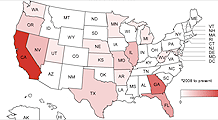40 banks failures in 2009
Banks in Georgia, North Carolina and Kansas are closed by regulators as the financial crisis takes a toll on local banks across the nation.
NEW YORK (CNNMoney.com) -- Regional banks in North Carolina, Kansas and Georgia were closed by state regulators Friday, bringing the total number of failed banks this year to 40, the Federal Deposit Insurance Corporation said.
The 24 branches of Wilmington, N.C.-based Cooperative Bank will reopen Monday as branches of First Bank, which is based in Troy, N.C.
Cooperative bank had assets of $970 million and total deposits of approximately $774 million. First Bank will assume all of the failed bank's deposits and agreed to purchase $942 million of its assets.
In Kansas, First National Bank of Anthony, which operated 6 branches - including two under the name of First National Bank of Johnson County - will be taken over by Bank of Kansas.
Bank of Kansas, which is based in South Hutchinson, acquired all of First National Bank of Anthony's $156.9 million deposits. It also purchased the bulk of the failed bank's $156.9 million worth of assets.
Meanwhile, the five branches of Southern Community Bank, which is based in Fayetteville Ga., will become part of United Community Bank of Blairsville. It was the seventh bank to fail in Georgia this year.
United Community Bank paid a premium of 1% to acquire all of the of the $307 million deposits held in the failed bank. It also agreed to purchase approximately $364 million of assets.
The assets not purchased by the acquiring banks will be retained by the FDIC and sold later.
The FDIC said it entered into a "loss-share transaction" with the acquiring banks for a portion of the assets belonging to the failed banks. The arrangement is designed to maximize returns on the assets covered by keeping them in the private sector, the FDIC said.
"Under the loss sharing agreement the FDIC will reimburse United Community Bank for losses on Southern Community Bank's loans and foreclosed properties," said Jimmy Tallent, president and chief executive of United Community Banks, in a statement.
The total cost of Friday's bank failures to the FDIC is $203 million, bringing the total for this year to $11.53 billion. That compares with $17.6 billion in all of 2008.
So far this year, the number of bank failures has already exceeded last year's total of 25, with an average of nearly 7 failures per month.
The FDIC expects roughly $70 billion in losses due to the failures of insured institutions over the next 5 years.
The FDIC, which is funded primarily by fees paid by banks, insures individual deposits up to $250,000. The amount was increased from $100,000 late last year in response to concerns about the stability of the nation's banks.
The Obama Administration unveiled a highly-anticipated new plan to overhaul how banks and other firms are regulated in the hope of preventing another financial collapse.
Under the new proposal, the FDIC and other regulators would have more power to take over and unwind troubled financial companies beyond banks.
The plan would also, among other things, expand the powers of the Federal Reserve and create a new agency dedicated to consumer protection. ![]()


